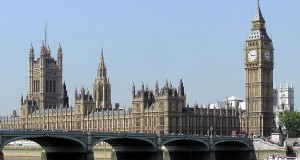This post was contributed by Professor Rob Singh of Birkbeck’s Department of Politics. It originally appeared on The Conversation on 24 September 2013.
And so the annual autumn ritual of American masochism begins again in New York. Like inviting your least likeable in-laws to detail your worst features to your nearest and dearest after an agreeable Christmas lunch, this week’s 68th UN General Assembly welcomes heads of state and government from its 193 member states. With its plenary session overshadowed by Syria, and issues from Iran’s nuclear programme and Israeli-Palestinian relations vying for competition on the agenda, the media expectancy is even greater than usual. “The stakes are very high,” according to PJ Crowley, a former assistant US secretary of state.
What fatuous nonsense.
While the invitees marvel at the size of the food portions in New York City, and media frenzies erupt at incipient photo opportunities in Turtle Bay, let’s recognise this week for what it is – a symbolic spectacle signifying minimal substance. Yes, an enticing opportunity for non-US leaders to grandstand on the biggest international stage for strictly domestic political benefit. And yes, a chance for mere politicians – democratic and authoritarian alike – to pose as statesmen and solemnly pledge their fealty to human rights, the rule of law, and international peace (how very controversial). But, ultimately, whether New York or Washington, DC is the more reliably dysfunctional venue for serious politicking is up for debate.
Even by the standards of US politics, watching an array of exotic guests use one of the nation’s great cities to excoriate America and hail the arrival of a new “post-American era” must represent one of the more depressing spectacles for the domestic public. Sadly for the scriptwriters, the drama is not quite as vivid as when Chavez, Ahmedinajad and Gaddafi enjoyed their 15 minutes of fame denouncing George W Bush. Through fair means and foul, these characters have moved on.
But already, new scripts have been written and the question is merely whether the actors play their roles accordingly. Above all, will the Iranian and American presidents finally break a taboo and meet in the Great Satan’s living room (not, like Gordon Brown, in the UN kitchen)? Will the recent conciliatory words and gestures of President Hassan Rouhani receive symbolic reward – a presidential handshake, a deliberately accidental encounter, even a “meet and greet”?
To which the appropriate response is: “So what if they do?”.
Prior US presidents viewed the annual UN debate with emotions ranging from resignation to despair. But for Barack Obama, it’s tailor made. Teleprompter to the ready, warm words to go and nothing of substance to slog through. Only if one still buys into “Obama-world” – where grand speeches substitute for hard bargaining – can one continue to regard this earnest symbolism and soaring rhetoric as remotely consequential.
As such, it’s tempting to view the NYC goings-on as emblematic of not just the weakening of the West but also the end of US leadership.
But this wisdom is far more conventional than wise. On most measures of national power, the US remains far beyond all other nation-states. Not only is it the only player capable of global power projection, but America’s energy revival promises a “power surge” of substantial and enduring economic and geo-political dividends. No other power, or combination of powers, is likely to rival the US for decades to come.
The strategic problems, rather, are two-fold.
First, the UN’s profound limitations remain. A Security Council that reflects the power distribution of 1945, not 2013. A veto system that effectively precludes collective action even when genocide, ethnic cleansing and civil war destroy tens of thousands of lives and displace millions. And a gaping legitimacy deficit in which prolific UN declarations about the “responsibility to protect” are consistently belied as hollow by its inability, unwillingness and incapacity to do so.
Second, it is not American weakness that is at issue, but the irresolution, confusion and dwindling credibility of this particular White House. Like a poker player who believes that decent chaps don’t bluff, Obama is neither trusted by his allies nor feared by his adversaries. On the 50th anniversary of JFK’s assassination, one has to go back to Kennedy’s besting by Nikita Khruschev at the 1961 Vienna summit to recall a US president so powerfully outplayed by his Russian rival. But that was in Kennedy’s first year as president. Less than a year after his re-election, Obama appears adrift, ineffectual and preoccupied by domestic, not international, politics.
Whether or not Obama meets Iran’s president, few will mention the recent appointment of hardliner Ali Shamkhani as secretary of Iran’s Supreme National Security Council, a clear signal that Rouhani intends to preserve Iranian nuclear “rights”. Whatever the Russian delegation declares on Syria’s chemical weapons arsenal, few will focus on the 100,000 plus dead through conventional means of warfare – and counting. Festering issues from North Korea to a reconfigured and reinvigorated al Qaeda will receive minimal attention. And why should they? This week was never intended for serious diplomacy or meaningful negotiations. As for the Middle East, even now – never mind the rest of the world – Obama’s default disposition recalls Ernest Hemmingway’s in 1935: “Of the hell broth that is brewing in Europe, we have no need to drink.”
Mostly, the coming days represent theatre, and not especially impressive theatre at that. In the days of mobile phones, email and the internet, the notion that such international conflabs are necessary for genuine communication is redundant. It seems difficult, in that light, to entertain anything more than a minimal hope of substantive progress on Syria, Egypt, North Korea or any of the functional issues – from nuclear proliferation to climate change – that supposedly preoccupy our leaders.
Let’s hope I’m wrong. But ask yourself – when was the last time you either listened to, or took seriously, an Obama speech? Now imagine the response the average Syrian, Iranian, Israeli or Russian would have to that question. Ignore the theatrics and atmospherics. Lie back and take in the warm words. And watch the inaction.




